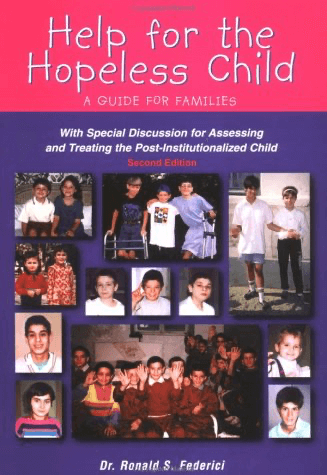Book
Help For The Hopeless Child
A Guide for Families
(with Special Discussion for Assessing and Treating the Post-Institutionalized Child)
By Dr. Ronald S. Federici
Book Review by Deb Schell-Frank, EdD
(Chosen Child Magazine, March 1999)
Book Details
About the book
As an adoptive parent and an international adoption professional, I have waited a long time for this book. Ronald Federici’s credentials as a world renowned neuropsychologist paired with his personal experience raising four children adopted from Eastern Bloc orphanages gives this book uncommon clarity and purpose.
Violence and aggression, chronic lying, intense tantrums, defiance of authority, under achievement in school, sexual acting out, manipulation and deceit, these are symptoms of hopeless children, passed from therapist to therapist with little or no results. Too many families have been on an endless search for help only to come up with the wrong label (too often ADHD) and the wrong solution (Ritalin) for their children’s chronic, disturbing behaviors that affect their ability to become attached in a social world. “Unique children require unique approaches”, says Federici, as he outlines his intense and innovative program of assessment and treatment throughout his book.
The first chapter is dedicated to understanding the problem, finding the right help and recognizing bonding and attachment as the key to a child’s stability within a family. Chapter 2 is very specific in defining the multidissciplinary evaluations recommended and the roles of a myriad of professionals that may work with the family. A great deal of information about childhood depression is also included. Chapter 3 serves as a condensed handbook on a wide range of psychiatric disorders, their symptoms and behavior manifestations, including everything from learning disabilities to schizophrenia. Chapter 4 is dedicated to the complexities of adoption. I would recommend every adopting family have this book in their library for this chapter alone. It carries a wealth of information about both American and foreign adoptions, conditions in orphanages in different countries and exceptional information about preparing and returning home with your child.
In Chapter 5 Ronald Federici’s specific treatment approach is described. He admits his approach has been dubbed controversial as it runs contrary to the popular “all these children need is love” phase that has become a trademark of international adoption naivete. Chapter 6 outlines a long list of helpful supportive therapies; Chapter 7 is included as an instructional guide for other professionals working with the hopeless child and the final chapter addresses prevention and changes for the next generation.
With the help of this book, families can direct the assessment and treatment of their children with severe symptoms that affect their attachment, behavior and socialization.
This is a must reading for any family who has adopted a child older than 2 years of age or any family considering international adoption. In fact it is an excellent resource for any family with a “hopeless” situation regardless of where the child was born. Ronald Federici suggests, “A strong brain and strong soul appear to be the critical factors in surviving an institutional life”. I would add strong, committed parents to that equation, who may find the support they need in this exceptional book.
Ronald S. Federici is regarded as one of the country’s leading experts in the neuropsychological evaluation and treatment of severely disturbed children, particularly children from post-institutionalized settings. He served as Clinical Director of Neuropsychological and Family Therapy Associates in Alexandria, Virginia. He has appeared on numerous talk shows, radio talk shows and has written numerous articles for national and international magazines and newspapers. He resides in Virginia with his wife, Jane, and their four children, two from Ukraine and two from Romania.
